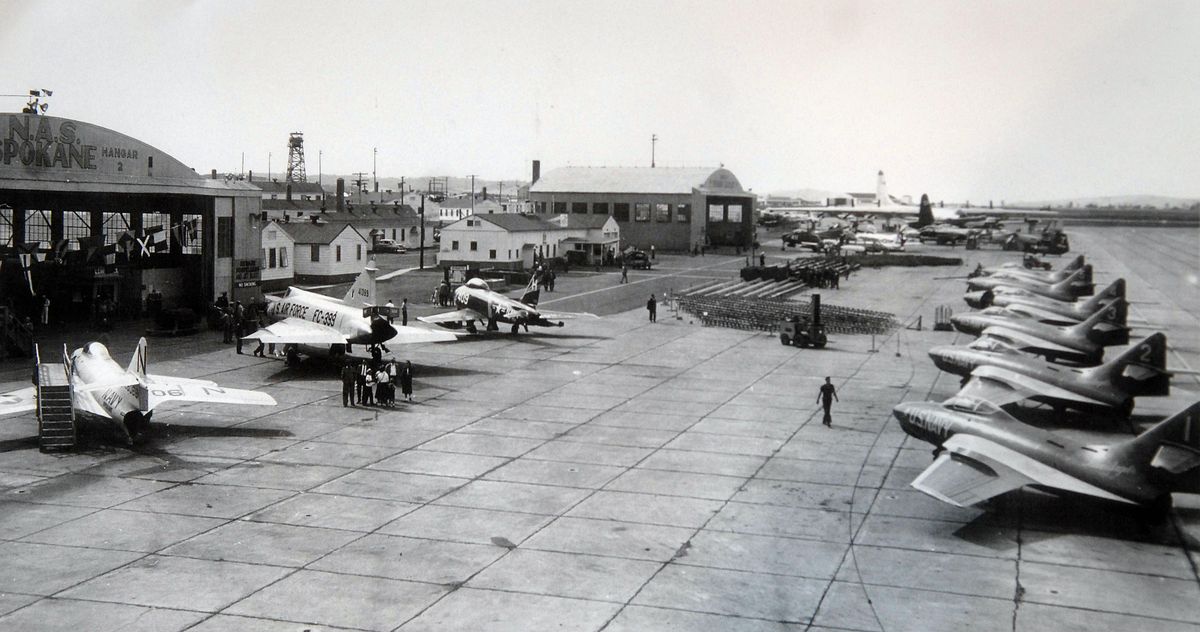For Blue Angels, a time warp
NAS Spokane veterans recall dazzling ’50s shows

A half-century ago, the Blue Angels helped pack a military base on the West Plains and thrilled tens of thousands of spectators with their aerobatics.
But when the Navy’s premier flying team returns to the West Plains this weekend, they’ll be parking their signature blue jets a little way down the road, at Fairchild Air Force Base.
That’s because in the 1950s, some military air shows were held at Geiger Field, which had a Naval Air Station as well as an Air National Guard facility.
Spokane may seem like an Air Force town these days, but 50 years ago it and the rest of the region had a significant Navy presence, some veterans of NAS Spokane recalled Monday. The Navy had a large supply depot in the Valley during World War II, and thousands of sailors who were drafted or enlisted for that war had been trained at Farragut in North Idaho.
In 1948 the Navy opened air stations in Spokane and other cities around the country to handle a situation that arose after the war.
“The Navy had many pilots that were doing nothing,” said Bill McDonald, who helped open NAS Spokane in 1948 and was a “station keeper” until it closed.
They also had plenty of planes headed for the “boneyard,” said Rich Peterschick, another NAS Spokane station keeper. Rather than scrapping some of the planes, the Navy sent them to air stations where crews could stay current as naval reservists, flying one weekend a month and serving two weeks of full-time duty a year.
NAS Spokane shared Geiger Field with the Air National Guard for about 10 years. At its height it employed about 200 full-time station keepers and had about 500 Navy reservists maintaining the flying skills they’d learned in World War II or Korea.
The Navy sent a series of aircraft, from World War II torpedo bombers and F-4 Corsairs to the F-9 jets, plus the equipment necessary to maintain them. Station keepers built hangars and converted some buildings left over from the old Army Air Corps operations at Geiger.
“It was just like a little city,” said McDonald. “Everybody had their function.”
Full-time personnel kept the planes ready for use on the weekends. They handled the supplies, paperwork and building maintenance, and pulled sentry duty one night a week. When the snow got deep, they used their rotary plow to keep runways open for Spokane International Airport, which had been built on the other side of Geiger Field. Sometimes they’d use the station’s firefighting equipment to help battle a blaze in surrounding communities.
It was good duty, although military pay wasn’t much in those days, Tony Danelo, another station keeper recalled. They got two days off a week and often had other jobs to supplement their pay.
Because it was a Navy station, the Blue Angels were booked for the Geiger air show in 1953, 1955 and 1956. They were a huge draw, Danelo recalled: “The whole runway was lined with people.”
News accounts from the time describe awed crowds, estimated at 100,000 – and big traffic jams. The staff at NAS Spokane made quite a bit of money for its recreation fund selling beer and hot dogs, Peterschick recalled. So much so that before the station closed in early 1958, they had to throw several parties to empty the fund.
NAS Spokane and many of the other air stations were closed in the mid-1950s. The Navy was consolidating its bases, and there weren’t as many weekend warriors.
“Guys came back from Korea, and their wives said, ‘No way are you joining the Reserves,’ ” McDonald said.
The full-time station keepers were assigned to other bases, but some returned to Spokane after they retired. Sometimes they had to live somewhere else to discover what a good place Spokane was, N.A. Rolfe said.
This weekend, the station keepers’ organization will have its own display of NAS Spokane in a hangar at Fairchild’s Skyfest. They’ll have a reunion luncheon at the Longhorn Barbecue on Saturday, then head down the road to see the Blue Angels wow a Spokane crowd one more time.